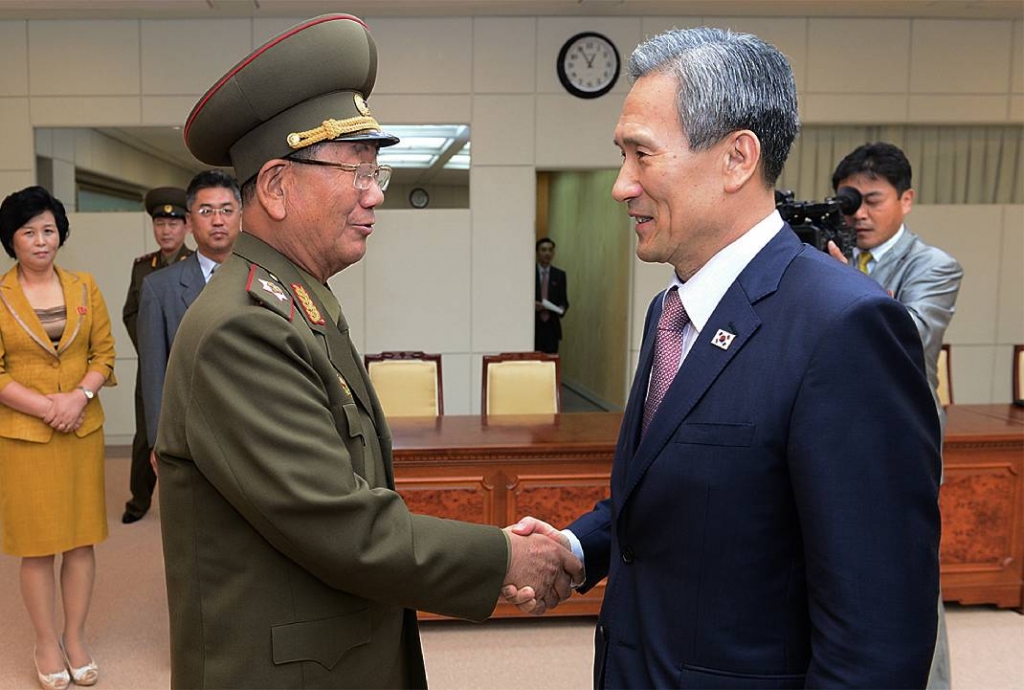-
Tips for becoming a good boxer - November 6, 2020
-
7 expert tips for making your hens night a memorable one - November 6, 2020
-
5 reasons to host your Christmas party on a cruise boat - November 6, 2020
-
What to do when you’re charged with a crime - November 6, 2020
-
Should you get one or multiple dogs? Here’s all you need to know - November 3, 2020
-
A Guide: How to Build Your Very Own Magic Mirror - February 14, 2019
-
Our Top Inspirational Baseball Stars - November 24, 2018
-
Five Tech Tools That Will Help You Turn Your Blog into a Business - November 24, 2018
-
How to Indulge on Vacation without Expanding Your Waist - November 9, 2018
-
5 Strategies for Businesses to Appeal to Today’s Increasingly Mobile-Crazed Customers - November 9, 2018
Rival Koreas find a way to avoid disaster, reach deal
Reports further indicate that North Korea and South Korea have agreed to initiate follow up talks to discuss a range of issues to improve ties. The quartet faced off across a wooden table on the second floor of the Peace House, an imposing structure on South Korea’s side of the Panmunjom truce village straddling the border.
Advertisement
North Korea has been hit with United Nations and U.S. sanctions because of repeated nuclear and missile tests, moves that Pyongyang sees as an attack on its sovereign right to defend itself. By the close, the two sides hammered out a pact that ended a standoff that last week had included an exchange of artillery fire in one of the world’s most unsafe flashpoints.
Relations between Seoul and Pyongyang have begun thawing after the easing of military tensions that had escalated in recent weeks on the issues of landmine blasts and propaganda broadcasts which led to a war of words. While Seoul stopped broadcasting its propaganda Tuesday, troops from both sides remain near the Demilitarized Zone.
The two countries have also agreed to work towards reuniting families separated by the 1950-53 Korean War, as well as restoring NGO exchanges in various fields.
The roots of the standoff lie in landmine blasts on the border earlier this month that maimed two South Korean soldiers.
The de-escalation of tensions came after Pyongyang put its frontline combined forces into a wartime state on August 21 in protest against the resumed South Korean psychological warfare with loudspeakers in border areas.
Pyongyang then made its ultimatum that Seoul halt the broadcasts by Saturday afternoon or face military action, but on that day the two sides agreed to hold talks between top level aides to the leaders of the two countries.
“‘The more important point is maintaining this channel and reopening the relationship”.
South Korean President Park Geun-hye had demanded a “definite apology” over the land mine blasts, and Kim, the Seoul negotiator, described the North’s expression of “regret” as an apology. After decades of animosity and bloodshed, finding common ground is a challenge. During the latest Panmunjom talks, the first session lasted about 10 hours and the second session about 33 hours.
In return, the DPRK reportedly lifted the order of its troops into a state of war from noon as well. There have also been comparatively minor sources of conflict, such as South Korean activists distribution of anti-North leaflets and the suspension of South Korean tours to Mount Kumgang in the North.
“We’re going to judge the North by its actions”, U.S. State Department spokesman John Kirby told a briefing.
Advertisement
South Korean defense officials said during the negotiations that about 70 percent of the North’s more than 70 submarines and undersea vehicles had left their bases and could not be located by the South Korean military. They also said the North had doubled the strength of its front-line artillery forces since the start of the talks.





























